

Lessons Worth Sharing. Harvard backs open access in face of ‘prohibitive’ journal costs. A committee of senior Harvard academics has urged the university’s staff to publish in open access journals amid concern that the cost of journal subscriptions is becoming “untenable”.
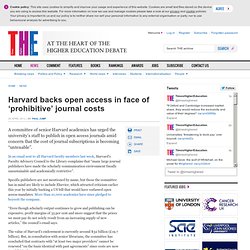
In an email sent to all Harvard faculty members last week, Harvard’s Faculty Advisory Council to the Library complains that “many large journal publishers have made the scholarly communication environment fiscally unsustainable and academically restrictive”. Specific publishers are not mentioned by name, but those the committee has in mind are likely to include Elsevier, which attracted criticism earlier this year by initially backing a US bill that would have outlawed open access mandates. Academic publishing: Open sesame. Nonprofit grassroots movement seeks student loan debt forgiveness « The University News. New York lawyer Robert Applebaum created a national student debt forgiveness proposal in 2009.
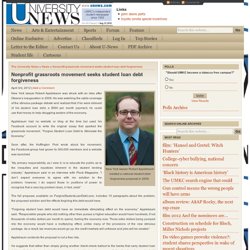
New York lawyer Robert Applebaum was struck with an idea after Obama’s inauguration in 2009. He was watching the cable coverage of the stimulus package debate and realized that if he were relieved of his student loan debt, a $500 per month payment, he could use that money to help struggling sectors of the economy. Applebaum had no website or blog at the time but used his Facebook account to write the original essay that sparked the grassroots movement, “Forgive Student Loan Debt to Stimulate the Economy.” Soon after, the Huffington Post wrote about the movement, the Facebook group had grown to 300,000 members and a website was launched. Accesselearning Tutorial: Overview.
Education's Economics Of Scarcity. All across the United States, nay all around the world, the message about higher education is uniform: More people should go to university.

President Obama has repeatedly stated on record that "by 2020 America will once again have the highest proportion of college graduates in the world. " The Lumina Foundation is working to increase the proportion of Americans with degrees to 60% by 2025. That would be a huge increase because currently less than 30% of adults in the United States have a degree. The demand is not limited to the United States alone: According to UNESCO, India could build a new campus every two weeks until 2025 just to account for the demand.
During the short seven months I spent at college, I, like so many other college freshman, took Economics 101. Educational Psychology. eMarketing. Results - NRC Assessment of Research Doctorate Programs - The Graduate School at UNC-Chapel Hill. Can Our Great Universities Lead in a Time of Need. What’s On the Horizon in Higher Education. Big Ideas Culture Digital Tools Teaching Strategies Flickr: Dexterwas How will college life be different in five years than it is today?
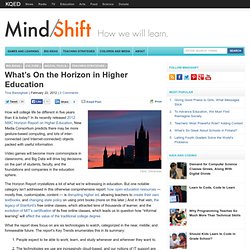
In its recently released 2012 NMC Horizon Report on Higher Education, New Media Consortium predicts there may be more gesture-based computing, and lots of inter-connected (and Internet-connected) objects packed with useful information. Video games will become more commonplace in classrooms, and Big Data will drive big decisions on the part of students, faculty, and the foundations and companies in the education sphere. Venture Capital in Education: New Technology and New Solutions. At last week’s SXSW interactive conference, blogger Betsy Corcoran of EdSurge convened a panel discussion among venture capitalists on the future of education technology: “ Classroom 2020: VCs and the Education Revolution ”.

Participants included Mitch Kapor of Kapor Capital, Phillip Bronner of Novak Biddle Venture Partners and Rob Hutter of LearnCapital . Education startups are “hot” right now, with stories on TechCrunch , big funding rounds and pop culture attention . Office of Educational Technology. Change happens big in technology and it happens fast.
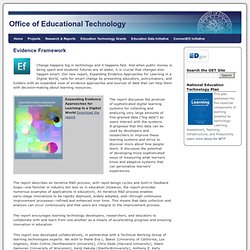
And when public money is being spent and students’ futures are at stake, it is crucial that changes also happen smart. Our new report, Expanding Evidence Approaches for Learning in a Digital World, calls for smart change by presenting educators, policymakers, and funders with an expanded view of evidence approaches and sources of data that can help them with decision-making about learning resources. The report describes an iterative R&D process, with rapid design cycles and built-in feedback loops—one familiar in industry but less so in education (however, the report provides numerous examples of applications in education).
Office of Educational Technology. By accelerating the pace of innovation in learning sciences and technologies, the United States has the opportunity to close the achievement gap, improve national competitiveness, and drive economic growth.
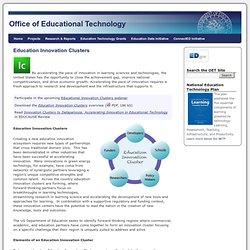
Accelerating the pace of innovation requires a fresh approach to research and development and the infrastructure that supports it. Education Innovation Clusters. Student Financing of Graduate and First-Professional Education, 1999-2000. Carnegie Learning - Higher-Ed Curricula. Community colleges must adapt to the needs of their students, from working adults to young undergrads, who may be arriving on campus anxious to move ahead but not yet ready for college math.
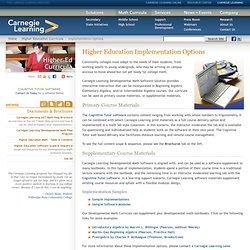
Carnegie Learning Developmental Math Software Solution provides interactive instruction that can be incorporated in Beginning Algebra, Elementary Algebra, and/or Intermediate Algebra courses. Our curricula can be used as primary course materials, or supplemental materials. Primary Course Materials The Cognitive Tutor software contains content ranging from working with whole numbers to trigonometry. It can be combined with select Carnegie Learning print materials as a full course delivery option and implemented in a math lab style classroom. To see the full content scope & sequence, please see the Brochures tab at the left.
A Boom Time for Education Start-Ups - Technology. By Nick DeSantis Harsh economic realities mean trouble for college leaders.
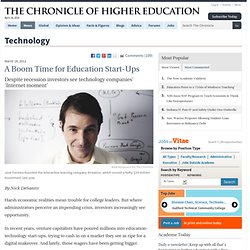
A Disrupted Higher-Ed System - Next. The “disruption” of the higher-ed market is a popular refrain these days.
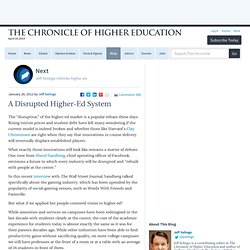
Rising tuition prices and student debt have left many wondering if the current model is indeed broken and whether those like Harvard’s Clay Christensen are right when they say that innovations in course delivery will eventually displace established players. What exactly those innovations will look like remains a matter of debate.
One view from Sheryl Sandberg, chief operating officer of Facebook, envisions a future in which every industry will be disrupted and “rebuilt with people at the center.” When I sold out to advertising - Life stories. The best cautionary story I ever heard came from a distinguished man in a snug, hillside coffee shop on a thundery Seattle afternoon. I was new to the area, trailing a high-tech spouse who worked 14-hour days. The gloom had settled in. It was good weather for writing but after several hours, scenes from “The Shining” would be running through my head. Publications. Youth and Digital Media: From Credibility to Information Quality by Urs Gasser, Sandra Cortesi, Momin Malik, Ashley Lee.
Urs Gasser Harvard University - Berkman Center for Internet & Society; University of St. How to Apply — College of Education. Application for Non-degree Status. Davin Carr-Chellman — College of Education. Ph D, Pennsylvania State University, 2011Assistant Professor of Education Davin Carr-Chellman is assistant professor of education with a joint appointment in the Adult Education Program, Department of Learning and Performance Systems, and in the Educational Leadership Program, Department of Education Policy Studies. He joined the faculty at Penn State in 2005 and has an ongoing research agenda focused on ethics, ethical development, educational philosophy, informal learning, communication and learning in non-formal environments, and qualitative research methods.
Ed.stanford.edu/sites/default/files/externalfellowships.pdf. The College Financial Aid Common Application. Tech Titans Aid Undocumented Students. The scientific argument for being emotional - Neuroscience. What’s On the Horizon in Higher Education. Prozac and Sexual Desire by Helen E. Fisher and J. Anderson Thomson Jr. Alex Peake's "Code Hero": How To Scale Education The Right Way. MyOSFA. Why Online Education Is Not Always the Answer. Like Peter Thiel's Fellows, Sebastian Thrun Dropped Out, Hacked Education, Too. It.coe.uga.edu/~lrieber/edit6900/pdf/rieber2004.pdf?activity=lit_example_rieber2004.
Sketchnotes of Ezio Manzini at School of the Art Institute of Chicago. This past Monday evening, on an unseasonably warm night in Chicago, sustainability expert Ezio Manzini gave a thought-provoking lecture at the School of the Art Institute of Chicago. A New Reason for Women to Invest in Education – Toyboys. Meet the Authors of Interaction Design. Home / About The Authors Yvonne Rogers Yvonne Rogers is a Professor of Interaction Design and director of UCLIC at UCL. She is also a visiting professor at the Open University, Indiana University and Sussex University. She has spent sabbaticals at Stanford, Apple, Queensland University, and UCSD. Blog - MITx. Considering College During a Recession? Think Again. Culture Teaching Strategies. Adult Degree Completion Strategies, 2010 to 2014: Grantee Abstracts – Lumina Foundation.
Education's Economics Of Scarcity. Washington Post education blogger writes sad defense of for-profit colleges - Washington Post. Voiceprinting. FACT SHEET: "Help Americans Manage Student Loan Debt" Debt and Degrees: College Grads Owe More Than Ever - Education.